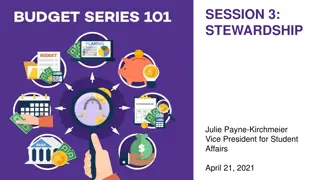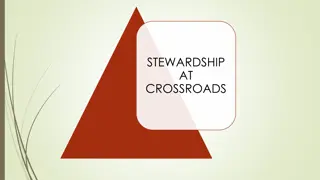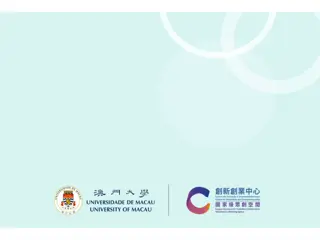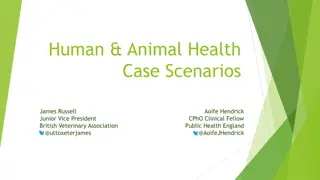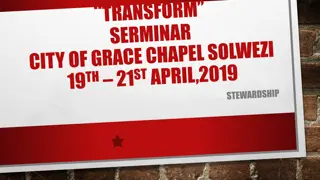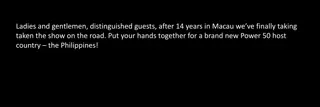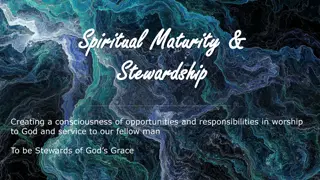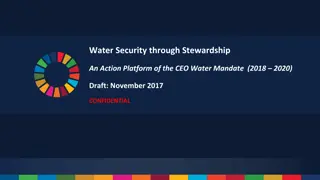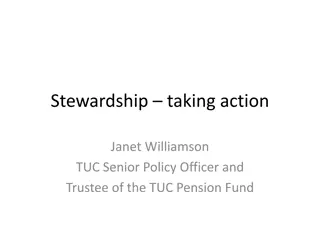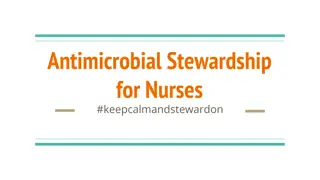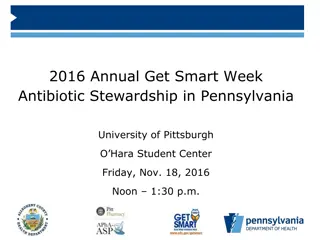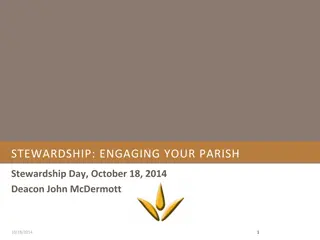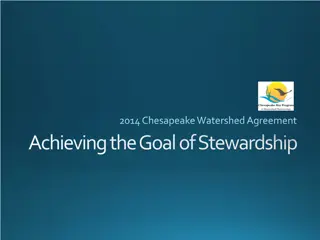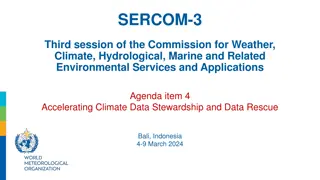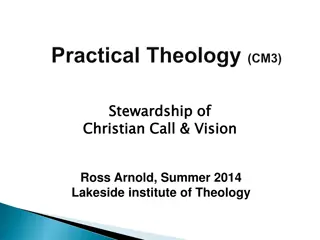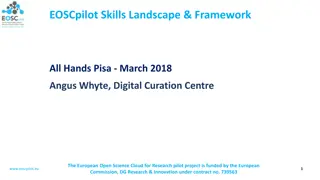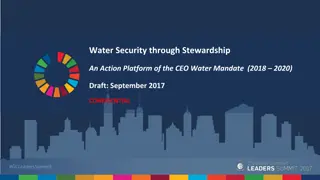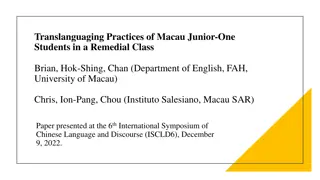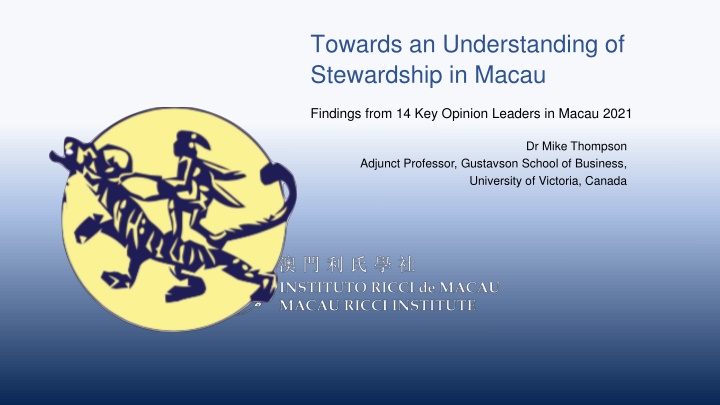
Towards an Understanding of Stewardship in Macau
Delve into stewardship perspectives in Macau through insights shared by 14 key opinion leaders. Dr. Mike Thompson, an Adjunct Professor at the Gustavson School of Business, University of Victoria, Canada, sheds light on stewardship practices and trends in Macau for 2021.
Download Presentation

Please find below an Image/Link to download the presentation.
The content on the website is provided AS IS for your information and personal use only. It may not be sold, licensed, or shared on other websites without obtaining consent from the author. If you encounter any issues during the download, it is possible that the publisher has removed the file from their server.
You are allowed to download the files provided on this website for personal or commercial use, subject to the condition that they are used lawfully. All files are the property of their respective owners.
The content on the website is provided AS IS for your information and personal use only. It may not be sold, licensed, or shared on other websites without obtaining consent from the author.
E N D
Presentation Transcript
Towards an Understanding of Stewardship in Macau Findings from 14 Key Opinion Leaders in Macau 2021 Dr Mike Thompson Adjunct Professor, Gustavson School of Business, University of Victoria, Canada
Stewardship Stewardship is an expression of ethical behaviours of responsibility, accountability and activity in the management of resources for the common good beyond self / organisational immediate interest.
RESEARCH APPROACH Approach Towards an understanding of stewardship in Macau is a dialogical social enquiry, a conversation in which the interviewer explores the interviewee s own habitus and application of stewardship. Research insights are gained by being clear about the roles and relevance of one's dispositions and their recursive relationship with habitus, including cultural artefacts like knowledge and values. Rooney (2013). Objective To analyse how key opinion leaders from civil society and business organisations understand stewardship to benefit the social, environmental and economic wellbeing of Macau s citizens. Interviewees reflected their experiences and insights into stewardship combining personal and organisational and sector perspectives. The interviews were recorded and transcribed for textual analysis.
EXPLAINING STEWARDSHIP For most interviewees the concept of stewardship was not a familiar term, but for many it is understood as a form of CSR. I think not many people understand the concept of stewardship and CSR here. I Interviewees interpreted stewardship in relation in the way that they personally viewed their professional role and responsibility. think it is all about accountability...the planning and management of resource. PP The four educational interviewees gave a much wider societal interpretation to stewardship as a responsibility of trust to manage resources and heritage, and to provide a sense of moral consciousness for the long term good of the community. The word is not a common word, right? It simply means responsible use or responsible care, so it links with a with a corporate social responsibility. KN Most respondents appeared ambivalent about defining the role and responsibility of the Macau government in stewardship.
STEWARDSHIP BEHAVIOURS From an analysis of the interviewee textual corpora six behaviours, or dimensions, of stewardship were derived 1. CSR engagement 2. Educational commitment; 3. Environmental preservation 4. Social care 5. Social care for non-residents 6. Ethical motivation
CSR ENGAGEMENT Interviewees referred mainly to gaming resort CSR engagements which supported social and educational causes in Macau. Casino companies have shown quite a degree of corporate responsibility during the crisis. HB For example: Galaxy Macau hire people with learning difficulties. Sands educates small enterprises on cost and procurement management to be profitable They do fantastic CSR work...greening and plastic, and they do take care of their staff. But at the end of the day the product that they re producing in Macau has got huge negative social impacts as well...Taking a stewardship perspective, how does one look at Macau with the social consequences of addictive gambling and at the same time those organisations that also doing a lot of good? TM No interviewees referred to CSR activities that directly address what AB refers to as Illegal or potentially illegal activities and the social personal impacts.
EDUCATIONAL COMMITMENT interviewees referred an instinctual sense of responsibility to support the educational development of the population directly or indirectly. First and foremost as a business leader, I think that we have the responsibility to make sure we nurture our employees and provide educational opportunities. Anon Two interviewees thought that there should be a higher- level educational aim in mind-formation and humanities education. As an entrepreneur, my responsibility is to help staff to take training courses...give them the time and subsidise the fees. SL There's no philosophy. There's no studies of civilizations. So there's no humanities DD
ENVIRONMENTAL PRESERVATION People are genuinely trying to respond, whether it's plastic bags or straws. The community does react once they know about different initiatives and they do want to make it a greener society, or I really do, especially in the corporate sector. TM Environmental stewardship topics were raised by only five of the 14 interviewees and focused on Green cover targets Environmental experimentation such as aquaponic farming Plastic use management It was noteworthy that none of the interviewees volunteered the stewardship of Macau s built heritage. This has become a very good place for social and environmental experiments, so Macau could play a very important role in, you know, testing and pioneering and championing some. We have now the introduction of new aquaponics.... farming on water on a low space...there's a lot of work being done on food. Recycling in some of the casinos together with some international organisations. AB
SOCIAL CARE The single core behaviour that was expressed by all interviewees through varying narrative accounts and statements on values and responsibilities was care: for young people, for seniors, for employees and for the development of Macau s citizens. Of course, there are resources, but it is a group of disadvantaged groups that the government has not been able to fully satisfy. CTF Interviewees expressed the stewardship of social responsibilities in three key themes: A just use of resources for the common good, local and global communities Community philanthropic concerns and care for seniors, ex-offenders, for those affected by physical and mental disabilities and the need to reskill middle-aged women, Preserving the past for the future Those who are unable to fish should be looked after by the government. SL
SOCIAL CARE FOR NON-RESIDENTS We had over 180,000 migrants working in Macau...but now about 20,000 are unemployed. Their contract was terminated but they cannot go back to their own countries. We provide some assistance to some 2,000 people. We are taking care of the migrants who are in need in Macau. PP Despite the strong duty of care espoused, a number of interviewees pointed to a gap between the care given to Macau s citizens and that given to migrant workers. The gap was most apparent during the height of the Covid-19 pandemic when migrant workers were unable to work and were unable to return home due to flight restrictions. The blind spot seems to be about how you treat non-Macau workers. There's a very clear hierarchy between people from Macau, people from the mainland, and people from elsewhere. And I don't mean Caucasian people from elsewhere. I mean, Filipinos, Indonesians, Vietnamese. They seem to be much less concerned about treating those employees well than protecting the rights of Macau employees. SM Interviewees highlighted: A sense of responsibility by all to address the needs of migrant workers, especially the unemployed, and. Concern that an underclass has been created in Macau and that this is unjust.
ETHICAL MOTIVATION Values not money no shortcuts to make money. Don t cheat, its s not sustainable. SL To be honest and to take the interest of the community as a whole into account. HB Integrity and sincerity and honesty and straightforwardness. There's a premium on those culturally highly prized notions of sincerity and societal harmony. SM By helping one person leaving prison who would be able to help the family and improve the whole society. We care for the one with difficulties. PP So essentially it comes down to looking after people when it's about the moral values. CD Be kind, don't cheat - no shortcuts. SL The Christian teaching neighbours...integrity, active ethics and social responsibilities. SA Interviewees closely related stewardship with tacit ethical values and the practice of justice, They recognised individual and corporate ethical behaviour, a fusion of professional morality with corporate ethics as stewardship. Three key themes emerged: Stewardship ethical behaviours: responsibility, accountability, integrity, honesty, sincerity, social harmony and solidarity. Role-related responsibility to give back from privilege and to manage with ethics. A sense of a shared good and communitarian solidarity. is to love your
SUMMARY The findings of this research do not suggest any philosophical, classical or religious references or background. Interviewees recognised the long-term best interests of different communities in Macau and their own role in supporting those interests. Interviewees suggested personal ethical motivations and ideals inherent in the prosaic practice of solidarity and engagement predominantly in meeting the social and educational needs of different sectors in Mecanese society. This study supports stewardship prosocial behaviour through the espoused praxis of stewardship by the interviewees

